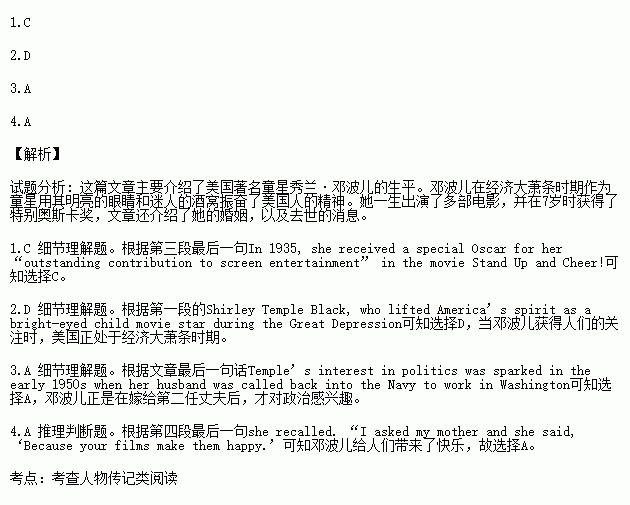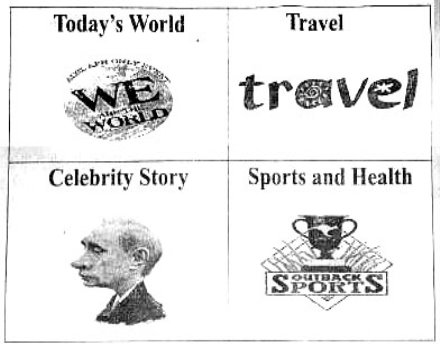题目内容
Shirley Temple Black, who lifted America’s spirit as a bright-eyed child movie star during the Great Depression, peacefully passed away at her California home on Monday evening at 85, surrounded by her family and caregivers.
Temple, born on April 23, 1928, started her entertainment career in the early 1930s and was famous by age 6. Temple was 3 when her mother put her in dance school, where a talent scout spotted her and got her in Baby Burlesks, a series of short movies with child actors playing in adult movies.
Movie studio directors took notice of her and in 1934 she appeared in the film Stand Up and Cheer! and her song and dance caught people’s attention. Movies such as Little Miss Marker and Bright Eyes featured her signature song. In 1935, she received a special Oscar for her “outstanding contribution to screen entertainment” in the movie Stand Up and Cheer!
She made some 40 feature movies, including The Little Colonel, Poor Little Rich Girl, Heidi and Rebecca of Sunnybrook Farm, in 10 years, starring with big-name actors like Randolph Scott, Lionel Barrymore and Jimmy Durante. Temple was a superstar before the term was invented. She said she was about 8 when crowds shouting their love for her made her realize she was famous. “I wondered why,” she recalled. “I asked my mother and she said, ‘Because your films make them happy.’ ”
Her child career came to an end at 12. She tried a few roles as a teenager—including opposite future president Ronald Reagan in That Hagen Girl – but retired from the screen in 1949 at 21.
Temple was only 17 when she married for the first time to John Agar, who would eventually appear with her in two movies. Their five-year marriage produced a daughter. In 1950 she wed Charles Black in a marriage that lasted until his death in 2005. She and Black had two children. Temple’s interest in politics was sparked in the early 1950s when her husband was called back into the Navy to work in Washington.
1.For which movie did Shirley Temple win the Oscar?
A. That Hagen Girl
B. Little Miss Marker
C. Stand Up and Cheer
D. The Little Colonel
2.When Temple first caught the audience’s eyes, ____.
A. she hoped to play a role in a series of movies
B. her family was offered
C. her mother sent her to a local dance school
D. the United States was in fact in financial straits
3.After Temple got married to Charles Black, ____.
A. she might have begun her political life
B. she had to raise her two young children
C. she decided to work for the Navy
D. she ended her film career on screen
4.It can be inferred from the fourth paragraph that ___.
A. people could find happiness in Temple’s films
B. Temple’s mother only focused on income
C. Temple disliked crowds shouting at her
D. Temple’s mother was worried about her
下面这幅图展现了我国大学热门专业的变迁。请根据你对这幅图的理解用英语写一篇短
文。
Popular University Majors in China Maths Civil Engineering Physics International Finance Computer science Automation Engineering
In the early 1980s In the 1990s Around 2000 In 2014 |
你的短文应包含以下内容:
1.简要描述上图中热门专业的变迁(30词左右);
2.分析变迁的原因(1-2个);
3.介绍你未来的专业选择并说明原因(1-2个)。
注意:
1.可参照图片中文字及下面文章开头所给提示作必要发挥。
2.词数150左右。开头部分已写好,不计入词数。
3.作文中不得提及考生所在学校和本人姓名。
Over the past 30 years, China has witnessed great changes in popular university majors.



 Chemistry International Trade Telecommunications Engineering
Chemistry International Trade Telecommunications Engineering